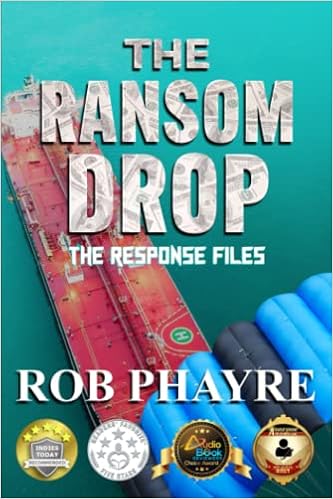Finished a fascinating novel by Rob Phayre, The Ransom Drop, narrated on Audible.
The novel narrates the seizure of Hibernia III, a supertanker chartered to carry gasoline and other petroleum products to Mombasa, Kenya.
Ransom Drop, unlike the typical thriller that paints antagonists in simple tones of evil, offers a close view of life in the Somali beachfront village that serves as the pirates' base. Phayre manages to get the reader to regard them with some empathy, while also making it clear that piracy poses great danger to people and the ocean environment. Even if nobody is killed in the process, it corrupts the economy, wastes resources, and traumatizes the hostages.
Unlike the authors of thrillers who work mainly from news articles or their imagination, and would quickly pass over how an emergency response team acquires cash, equipment, and weapons, Ransom Drop walks the reader through every detail. For example: assembling a pallet-load of fresh currency and shifting it from a bank in Athens to a bizjet at the city airport takes days of paperwork and the efforts of many people, including a "cash in transit" firm that is bonded and insured to move such sums a few miles here or there. We learn about the precautions the shipowner's team takes to see that the pirates fulfill their part of the deal: freeing hostages, ship, and cargo.
We see into the psychological tactics that negotiators use to move the dealings forward while not giving up too much. All this is done under the eyes of a lawyer for the shipowner's insurance firm. We can hope pirates don't take up Phayre's book -- they'd probably learn some things.
While very little is left out of the process, Phayre does mention without elaborating that the families of the hostages, if they take advantage of press coverage, can interfere with the steps being taken by shipowner, response team, and insurance company. Families and reporters are not part of the ensemble of this book.
Phayre does combine past and present. The narrative appears to be set partially in the present, given the references to some present-day technology. But it also reaches into the past, presenting this hijacking as the first one along the Somali coast. The pirates have to learn how to board a supertanker and subdue its crew with only three fighters; and the response team has to figure how to deliver hundreds of pounds of cash without something going wrong.


